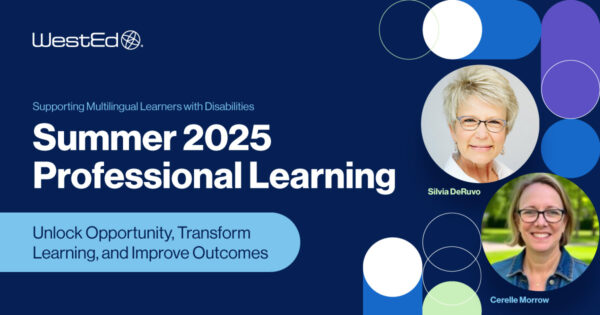
December 21, 2023
By Elizabeth Burr and Alyssa Perez
High-quality early childhood education is crucial for children’s long-term academic success. In recent years, California has committed to strengthening early learning, including historic investments in Universal Prekindergarten (UPK), which dramatically expands access to the California State Preschool Program (CSPP) and transitional kindergarten (TK). California’s approach to UPK embraces the view that a child’s experience with one or more languages is an asset to build upon and acknowledges that early identification of disabilities in children is key to improving their long-term outcomes.
An additional way to expand equity is to focus attention on where these two commitments meet. Nearly 60 percent of California’s children from birth to age 5 live in households where a language other than English is spoken (Holtby et al., 2017).
Given the diversity of home languages and dialects and the variation in children’s language development, distinguishing a multilingual child’s language development need from a disability-related need can be complex. To date, there is no state guidance for CSPP practitioners to follow when determining whether to refer multilingual children for a special education evaluation—a procedure known as the pre-referral process.
Pre-Referral Processes in California State Preschool Programs
 A new WestEd report, Pre-Referral Processes in California State Preschool Programs: How Practitioners Decide to Refer Multilingual Children for Special Education Evaluation, presents findings from a research study designed to better understand current pre-referral practices in the CSPP.
A new WestEd report, Pre-Referral Processes in California State Preschool Programs: How Practitioners Decide to Refer Multilingual Children for Special Education Evaluation, presents findings from a research study designed to better understand current pre-referral practices in the CSPP.
The following are some key findings:
- CSPP educators engage mostly in a pre-referral process that mirrors California’s Multi-Tiered Systems of Support framework, which was designed for students in grades K–12.
- The pre-referral process did not appear fundamentally altered to address multilingual language development.
- Many interviewees emphasized their efforts to provide home language support as part of a robust early learning experience for multilingual learners.
- Interviewees highlighted the benefit of having bilingual staff for engaging with multilingual children and their families.
- Content experts confirmed WestEd’s analysis that administrators often conflate bilingualism with a comprehensive understanding of multilingual learners’ language development.
“An important next step to advance the state’s equity goals is to address the intersection of language needs and disability in UPK. Absent guidance, we can’t get there in any consistent way.” —Elizabeth Burr
Based on the study’s findings, the research team generated numerous implications and recommendations for California to strengthen teacher and specialist preservice learning and improve the precision of pre-referral processes. The recommendations emphasize the importance of developing evidence-based and developmentally appropriate curricula as well as user-friendly guidance specifically related to multilingual children who might have disabilities. By implementing the recommendations in this report, California has an opportunity to not only assist educators in fostering the development and success of multilingual children but to also continue taking a leadership role at the national level.
“Practitioners need evidence-based pre-referral processes for all children, including multilingual children, so that multilingual children who might require special education services receive a timely evaluation,” said Elizabeth Burr, Senior Research Associate at WestEd and coauthor of the new report. “An important next step to advance the state’s equity goals is to address the intersection of language needs and disability in UPK. Absent guidance, we can’t get there in any consistent way.”
Read WestEd’s full report, Pre-Referral Processes in California State Preschool Programs: How Practitioners Decide to Refer Multilingual Children for Special Education Evaluation.
Questions? Contact Elizabeth Burr at [email protected].

With training in public policy, education, and social welfare, Elizabeth Burr is a Senior Research Associate in WestEd’s Research-Practice Partnerships team. Her work has focused on multilingual learners, including those who have learning disabilities, and early childhood education.
 Alyssa Perez is a Qualitative Research Assistant with WestEd’s Strategic Resource Planning and Implementation team. She supports the team with conducting research and providing technical assistance to state, regional, and district-level agencies.
Alyssa Perez is a Qualitative Research Assistant with WestEd’s Strategic Resource Planning and Implementation team. She supports the team with conducting research and providing technical assistance to state, regional, and district-level agencies.



